

Julius Rosenberg flanked by two sisters

"Never Losing Faith…"
for
Julius and Ethel
ROSENBERG
You may remember that when the world-wide Rosenberg-Sobell movement began in the Fall of 1951, its only assets consisted of good intentions. Its leadership was improvised, its friends few, its problems incredibly numerous.
Many changes took place between that beginning and the execution of the Rosenbergs in the face of the world-wide
pleas for clemency. Behind these changes stood what we have come to call the
"Rosenberg people." To us, the emergence of the "Rosenberg people" is one of the most significant
and hopeful developments in present day American history.
It is very hard for us to define a "Rosenberg person," and yet we know one when we see one. Frankly, we think such persons are the hope of humanity, and you must believe us when we say that we feel this very deeply and earnestly.
There is a whole category of "Rosenberg persons" that displays as its chief attribute a quiet, constant kind of heroism. Among them you will find obscure journalists, scientific workers, prominent lawyers, and others, who, when no one else would "go out on a limb," very simply placed their careers in jeopardy by coming forth publicly as organizers and speakers. It is important to know that many such people would not do this for any other cause; indeed, for many of these people it was their first venture into public life in their communities.
A very large number of "Rosenberg persons" were housewives and working women to whom the Case became part of their every day lives. They would no more omit a daily visit to a clergyman or some other work on the Case than they would omit feeding their children or punching a time-clock.
These "Rosenberg persons" grew in number and stature every day. They led the fifty major-city committees around the country and they inspired the hundreds of community committees throughout the land.
They differed in many ways, but they had this in common: they were utterly dedicated and devoted, they rose to the most trying occasions with a breathtaking determination and effectiveness, and they had the capacity to submerge and overcome the faults and frailities with which they came into the case. Every one of them emerged a new person, changed in a thousand indescribable ways. All of them became extremely conscious of their obligations as patriots, through all of them flowed a new awareness of their responsibility as citizens and human beings.
At first we met one here or there, and then we began meeting them by the scores, later by the hundreds, and finally we came to recognize thousands of them.
With the "Rosenberg people," our country came to life. The voice of the people was read and heard on the streets. The face of the people was seen at the White House.
Sing Sing’s death house, which was meant, perhaps, to become the tomb of the American spirit, became instead a point of inspiration.
Therein lies the story of the Rosenberg campaign. The dignity and courage of Ethel and Julius Rosenberg created the "Rosenberg people," and inspired a new understanding of the meaning of patriotism. The "Rosenberg people," in turn, moved literally millions of Americans to act on behalf of justice.
Nothing is so important for the future of our country as that these millions shall continue to be moved. The Rosenberg-Sobell Case is not closed. Justice will be won for Morton Sobell.
The "Rosenberg people" in their quiet, determined way will see to that.
|
|
|
|
|
|
|
|
|
|
|
 Julius Rosenberg flanked by two sisters |
|

"President Eisenhower’s experience has been largely military. Consequently, hewas concerned with the deterrent effect of the policy of execution. In my ownmind, he was not really informed of the legal aspects of the case, and he was notfully aware that the Supreme court had never looked at the record of this to test the weight and validity of the evidence and the fairness of the trial."
In gratitude to Dr. Loomer for his untiring efforts on behalf of clemency for Ethel and Julius Rosenberg, we dedicate this page to the Rosenbergs. In Dr. Lommer is embodied the true spirit of Christian mercy and justice. His last-minute efforts to save the Rosenbergs, when he called on President Eisenhower as a representative of 2,300 Protestant ministers, were in the true tradition and ethic of his calling. The rallies at which he spoke gained inspiration from his high ideals, and gave courage to others in the clergy to undertake the fight for clemency as a divine and patriotic task. His modesty, selflessness and true dedication, his sincerity and eloquence were a high mark in the campaign and a challenge to us to continue our work unabated until the task we have set before us has been done.
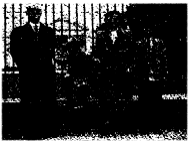
Rabbi Cronbach, Robby and Michael Rosenberg and
Mrs. Sophie Rosenberg in front of White House
| In appreciation to Rabbi Abraham Cronbach, professor | the three clergymen to see President Eisenhower in a |
| emeritus of Hebrew Union College of Cincinnati, | last-minute plea for clemency. His moving eulogy at |
| whose deep religious convictions of mercy and charity | the Rosenbergs’ funeral rites was a statement of faith |
| led him wholeheartedly into the fight for Ethel and | and hope and a prayer for the future of our country |
| Julius Rosenberg. A rock of strength to Mrs. Sophie | he has served so long and well. It is in this spirit that |
| Rosenberg, mother of Julius, in her trying hours, a com- | we humbly thank him and dedicate this page in his |
| Fort to the Rosenbergs’ children, Rabbi Cronbach spent | name to the continuing fight for truth and justice in |
| Long hours on the White House Vigil and was among | the Rosenberg and Sobell case. |
|
"Yesterday, we were offered a deal by the Attorney General of the United States. We were told that if we cooperated with the government, our lives would be spared.
"By asking us to repudiate the truth of our inno cence, the government admits its own doubts con cerning our guilt. We will not help purify the foul record of a fraudulent conviction and a barbaric sentence. "We solemnly declare, now and forevermore, that we will not be coerced, even under pain of death, to |
bear false witness and to yield up to tyranny our rights as free Americans. "Our respect for truth, conscience and human dignity is not for sale. Justice is not some bauble to be sold to the highest bidder. If we are executed, it will be murder of innocent people and the shame will be on the government of the United States. "History will record, whether we live or not, that we were the victims of the most monstrous frame-up in the history of our country." --Julius and Ethel Rosenberg, June 3, 1953 |
Los Angeles San Francisco Seattle
The fight to save the Rosenbergs knew no borders.
We in Canada were proud to join in the campaign to save their lives. The all night vigils we held and the visits to the American Embassy with appeals for clemency represented the wishes of all justice-loving Canadians.
The people of Canada have a tradition of friendship with the people of the United States. It was in the interest of this friendship—as well as in the interest of justice and humanity—that we fought against the inhumane execution.
"The case against the Rosenbergs outrages logic and justice. It depends on the testimony of Greenglass and his wife…Greenglass is supposed to have revealed to the Russians the ‘secret’ of the atomic bomb. Though the information supposed to have been transmitted could have been important, a man of Greenglass’ capacity is wholly incapable of transmitting the physics, chemistry and mathematics of the atomic bomb to anyone. He and his wife were the only ones who pretended to connect the Rosenbergs with atomic espionage. New evidence makes even more plain what was plain enough before, that the prosecution’s case has no logic in it, and that it depends upon the blowing up of patently perjured testimony…"

Dr. Urey, Nobel Prize winner, physical chemist and one of the top atomic scientists in the United States, played an active role in the efforts to obtain clemency for the Rosenbergs. Puncturing myth after myth surrounding the "secret" of the atomic bomb, he did not hesitate to call America’s attention to doubts surrounding Greenglass’ ability to steal or pass on the "secret". His now-famous letter to the Editor of the New York Times did much to rally the world to fight for clemency, and his activities continued to the last moment as he tried in vain to see Attorney General Brownell and President Eisenhower. His courage was an inspiration, his tenacity a challenge and his real patriotism an example to all who played their part in the cause of justice and mercy. It is in this spirit that we dedicate this page to carrying on the fight for truth in the Rosenberg and Sobell cases.
The RosenbergsEthel and Michael, Robert and JuliusBy W.E.B. DuboisIt was the end of a long, dark day; a day of sorrowing and suffering. I was very, very weary. As the night fell and the silence of death rose aboutme, I sat down and lay my face in my hands and closed my eyes. I heard my own voice speaking: |
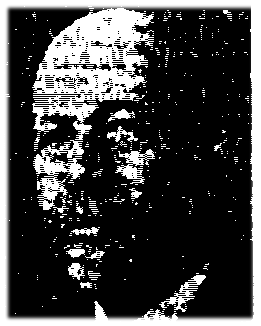 |
| Crucify us, Vengeance of God | drums | Surge of triumph and dirge of shame, |
| As we crucify two more Jews, | Alleluia, Amen! | Gather the mighty Dead: |
| Hammer home the nails, | Now out beyond the plain | Buddha, Mahmoud and Isaiah |
| Thick through our skulls, | Streams the thick sunshine, sheet on | Jesus, Lincoln and Toussaint |
| Crush down the thorns, | sheet | Savonarola and Joan of Arc; |
| Rain red the bloody sweat | Of billowing light! | And all the other millions, |
| Thick and heavy, warm and wet. | Above the world loom vast sombre | In throng on throng unending |
| We are the murderers hurling mud | hills | Weeping, Singing, |
| We the witchhunters, drinking blood | Limned in lurid lightings; | With music rising heaven-high, |
| To us shriek five thousand blacks | While from beneath the hideous sick- | And bugles crying to the sky |
| Lynched without trial | ened earth, | With trumpets, harps and dulcimers: |
| And hundred thousands mobbed | The sea rains up flood on flood | With inward upward swell of utter |
| The millions dead in useless war. But | To cleanse the heavens. | song. |
| this, this awful deed we do today | Twixt sun and sea, | Then through their ranks, |
| This senseless, blasphemy of birth | Rises the Great Black Throne. | Resplendent robes of silken velvet, |
| Fills full the cup! | Sternly the pale children march on | Broidered with flame, float down; |
| Hail Hell and glory to Damnation! | Bearing high on their hands | About the curling gown |
| O blood-stained nation, | Father and Mother. | enthrall, |
| Stretch forth your hand! Grasp it, | The drums roll until the Land quivers | Swirl out and grandly close, until |
| Judge | with pain | alone, |
| Wrap it in your blood-red gown; | And slowly yawns: | Two golden feet appear, |
| And lawyer in your sheet of shame; | The children prone bow down | As of a king descending to his throne. |
| Proud pardoners of petty thieves | They bow and kneel and lie; | In the great silence and embracing |
| Cautious rabbis of just Jehovah, | They lay within the earth’s deep breast | gloom, |
| And silent priests of the piteous | The beautiful young mother and her | We the murders |
| Christ; | mate. | Groan and moan: |
| Crawl, wedded liars, hide from sight, | Straight up from endless depths | "Hope of the Helpless |
| In the dirt of all the night, | Rise then the Bearers of the Pall | Hear us pray! |
| And hold high vigil at the dawn! | Sacco and Vanzetti, old John Brown | America the Beautiful |
| For yonder, two pale and tight-lipped | And Willie McGee. | This day! This day! |
| children | They raise the crucified aloft. | Who was enthroned in sunlit air? |
| Stagger across the world, bearing their | The purple curtains of Death unwind. | Who has been crowned on yonder |
| dead. | Hell howls, Earth screams | stair? |
| There lifts a light upon the Sea | And heaven weeps. | Red Resurrection, |
| With grim color, crooked form and | High from above it tears | Or Black Despair?" |
| broken lines: | Drops down a staircase from the Sun | |
| With thunderous throb and roll of | Around it with upstretched hands, |
|
Mary Church Terrell
|
 |
| "…As one who has lived richly in America, who loves America and respects America, I plead with you, Mr.
President, to stay the executioner and let the Rosenbergs live." |
|
|
--From a letter to the White House |
Mrs. Mary Church Terrell, outstanding Negro educator and leader, allowed neither her age nor the difficulties of the task to stay her from her duty to the America she has served so long and so well. Her appearances at meetings, her messages to officials in behalf of the Rosenbergs were inspirations to all. Her dedication to justice is our challenge, and we accept it—to carry on the fight in the Rosenberg-Sobell Case.

To the Rosenberg children and to the Sobell family, we make one promise. We will not forget.

|
"To Walk Hysteria…" |
"There can be Now…" |
|
|
|
|
|
| We pledge a continuing fight to vindicate Ethel and Julius Rosenberg and free Morton Sobell by making known the facts surrounding their trial—so that the Rosenberg children and all other Americans can walk free from the danger of conviction by hysteria and perjury. |
15,000 Americans at the White House Vigil... Train after train of people going to Washington to protest—to demand
clemency… Volunteers blanketing the nation, coast to coast, with leaflets…Thousands gathering at Ossining at the
gates of Sing Sing…People in action!…People on the march!… That was the campaign to seek mercy for the Rosenbergs. There can be no letdown now! I's back on the job…More leaflets…More rallies…More—and more—and more! To clear the Rosenbergs and a new trial for Morton Sobell. |
|
|
|
|
|
|
Rosenberg-Sobell Committee |
Rosenberg Committee |

From Michigan, Wisconsin, Chicago, Boston. From cities throughout the United States. Two women came from the Committee of Canadian Mothers. Some came intending to stay only a few days. They remained a week. The people were supposed to walk in two-hour shifts. Many walked for six and eight hours at a time.
It rained. Umbrellas were opened. But the umbrellas were not used to keep the people dry. They were held over the clemency signs so that not a single letter of the message of justice and mercy should be blurred.
For 22 days and nights the vigil continued. On January 5 the line swelled to 3,000 persons—men, women, and children determined to be heard. Later, in those crucial days of that final week in June, the line that had started with a few became 15,000. As a police department official said, "There has never been anything like this in Washington before."
|
"There is grave and well-founded doubt as to their (the Rosenbergs’) guilt. I want you to carry that conviction to your fellow men: I want you to talk about it; I want you to join us in stirring up as many of our fellow Americans as you can to an understanding of the facts and of the record….We are in the midst of the greatest witch hunt of all time….Our enemies, both internal and external, have given us some legitimate causes for fear….But we will not be intimidated by public clamor. We will continue to speak up for the truth…. We shall spread the gospel truth about the Rosenberg case….Our hearts and minds cannot tolerate injustice….We have to continue to speak out for justice even after the formalities of the law have been observed --Stephen Love, professor of law and former chairman of the Illinois Bar Association’s Committee on Character and Fitness, in an |
|
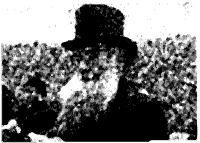
Rosenberg…went to their deaths with a composure
That astonished the witnesses."
…New York Times, June 20, 1953
By John Wexley*
|
There was mounting tension all that day. It kept increasing steadily until that hour of execution, when it reached its peak. Perhaps it was that so many new precedents had been established by this world-shaking case. Not the least of these was the "unseemly haste" of the Supreme Court in vacating the stay granted only two days before by Mr. Justice Douglas. Indeed, the rush in official circles to execute the condemned couple was of such magnitude that it swept up even the President, for his denial of clemency came less than thirty minutes after the Court’s fateful announcement. So excessive was the haste that the electrocution was moved up from the traditional hour of eleven at night
to just before sundown. Reportedly done to avoid desecration of the Jewish Sabbath commencing that Friday night,
the change was all the more shocking to most religious people, both Jew and Christian. For it had been expected
that the execution would be delayed until after the Sabbath rather than it be inaugurated with the shedding of
human blood. Many were reminded of the High Priest Caiaphus and his frantic haste with the |
Roman soldiery to end the last agonies of the crucified before sunset in order to preserve the sanctity of that other Sabbath night. Throughout the day, commentators interrupted broadcasts to report on the hour-by-hour bulletins from the death house. The constantly repeated question was whether or not the condemned would finally confess to their activities as A-spies and thereby save their lives, or would they go to their deaths with sealed lips, still insisting on their innocence. It was exceedingly strange that none ever considered the possibility that if the couple were indeed innocent, they could scarcely be informed about the secrets of an espionage ring. There was considerable tension in official quarters that day. In Washington, the Attorney General remained in his office until the very end, for he had arranged an open telephone line direct to Sing Sing in the event of a last-minute confession. In New York, in his chambers, the Judge who imposed the death sentences originally waited for word of final submission. More than once since the trial two years ago, he had indicated his certainty that only the Damoclean threat of the electric chair would force the convicted pair to recant and name their co-conspirators. How many exe ution dates he had set for them and how many times last-minute reprieves had almost cheated him. This time, however, one of them must break—if not the man, then the woman. She could easily pass the blame to her executed husband—as easily as her brother had passed it to them. Two long years he had waited for this final proof that he had been right all along—that they had their full day in court, had a fair trail, received a just sentence. Yet their endurance had been the greatest pos- |
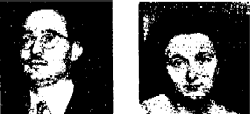
|
sible strain on him. It had been a terrible war of nerves but he had held firm despite all the unfair villification, despite all the appeals from the dupes and the do-gooders. Now the world could see—it was only a question of the breaking-point—it could be any minute now. There was very great tension throughout the world that day, but for other reasons than those of the commentators. Catholics from many countries had implored the Pope to intervene and he had tried three times to no avail. They could not comprehend how a civilized nation, professing belief in Christian ideals, could permit such torture and felt with His Holiness that to do this to a young mother of two small children was noth ing less than abhorrent. From London, Paris, Rome, Vienna, Dublin and Melbourne came reports of mounting anger, shock and dismay expressed by millions of all religions, all political shades of opinion. In the Place de la Concorde, tens of thousands gathered at midnight, but the nearby U.S. Embassy had guarded itself with a cordon of steel-helmeted poilus armed with machine guns and tear gas to keep the cries of protest at a safe distance. In London, as the minute hand of Big Ben neared the hour of one o’clock in the morning, and the great crowd of people who could not sleep that night grew silent before the entrance to Downing Street—suddenly a man sang out alone in the stillness the refrain from Joe Hill—"I never died, said he…" It was an unique thing—that no two children in the entire world had become so famous, so pitied as the little
Rosenbergs boys. In Chicago, Los Angeles, San Francisco—in Milan, Buenos Aires and even in places as far off as
New Zealand and Iceland, thousands gathered in prayer vigils to pray for them that night and |
for the lives of their father and mother. In the United States, millions had written hopefully to the President for mercy, for clemency, and now that it had been refused, were numbed with the shock of disillusionment. It had been the first time in many years that the conscience of America had been awakened. For the Rosenbergs had become a symbol; the sparing of their lives had come to express long-stilled hopes and yearnings for moderation, for a lessening of world tension, rather than a continuation of the suicidal arms race, for civilized negotiation of differences rather than atomic diplomacy, for peace rather than war, and now the death-knell was tolling not only for the Rosenbergs, but for the symbol they had come to represent. Within Sing Sing Prison itself there was also tension. Outside it walls, barricading all approaches, was a veritable army of State troopers, Ossining police and a large contingent of prison guards as well as unknown numbers of Federal undercover men. They were under stern command to prevent any public demonstration such as had taken place twenty-six years before in Boston, the night Sacco and Venzetti had been executed. Inside their cell blocks were the thousands of convicts waiting for the "grapevine" reports, all of
them acutely aware of the "dance party" to take place shortly—the first daylight execution in the history
of the prison. For more than two years they had been conscious of the two C.C.’s—Condemned Convicts 110,510 and
110,649— sweating it out in the death-row across the yard. Many felt a strong sympathy for them—not merely as fellow-
inmates, but as victims of stool-pigeon evidence. Few concerned themselves with the legal question of guilt or
innocence. Most were troubled rather by the moral question: how could a society eulogize an informer as a
|
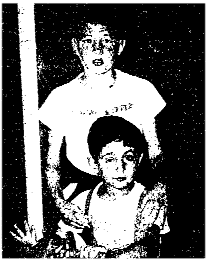
Intervened for an American Prisoner…"

|
patriot? How could such testimony be trusted at all? Most revolting, how could a brother send his own and only sister to the hot-seat to burn, while he got off with a five-year rap after parole? Many had followed the case over the prison radio. They had heard of the Vatican’s appeal for clemency and from others such as Dr. Albert Einstein, and yesterday they had heard about the appeal from the President of France. They had never known of such international great intervening in behalf of an American prisoner. Under such extraordinary circumstances, they felt certain a reprieve must come—had to come. Their tension was simply the waiting for it. In the visitors’ room were packed thirty-eight reporters. Three others, representing the major wire-services,
had been selected to witness the executions and then brief the rest on the macabre details. Thus, for these thirty-eight,
there was an additional stress of waiting to report something second-had. They had little to do but chatter speculatively
about which one of the pair might weaken first. Almost all fell into writing cliches about the inexorable sun setting
over the Hudson and |
the ominous prison clock ticking away. A few, however, had been there since early in the week. And somehow, their waiting these four or five days had given them an inkling of what the two years must have meant to the condemned—especially to Mrs. Rosenberg who had been kept in solitary confinement. These few tended to remain apart from the general chatter. Instead, they had begun to discuss, in discreet tones, of course, some of their increasing doubts. There was all the new evidence, never properly examined by the Supreme Court. There was the disturbing factor of accomplice testimony. Above all, there was the unusual severity of the sentence, not approved by any of the upper courts, not recommended by the original jury or even the prosecutor, but imposed solely on the judgment of one man, the sentencing judge. One reporter recalled a letter by Mrs. Rosenberg he had read in the National Guardian. She had drawn
a parallel between Judge Kaufman and the blood-thirsty John de Stogumber in Shaw’s St. Joan, with the latter’s
reactions to Joan’s burning, after he had staggered in from the spectacle, almost demented by remorse: |
|
There was only one place where there was any semblance of calm and serenity that day. It was in the woman’s wing of the death-house, where husband and wife had been permitted to spend their final hours together, talking quietly through a fine mesh screen wheeled in front of her cell. At 7:20 P.M., Julius Rosenberg said farewell to Ethel, his wife, by touching the tips of his fingers to hers through the mesh. They were then led to their separate execution cells where the guards made final preparations—the slitting of the trouser-leg, the shaving of the top of the head. Yet even during these last forty minutes of life, they were described as so strangely calm, that the most hardened prison officials were> amazed. It was precisely at 8:00 P.M. when Julius began to walk his "last mile" up that short, narrow corridor leading to the death chamber. Just ahead was the young Rabbi intoning from the 23rd Psalm: |
All he needed to do then, to save both their lives, was to nod his head to the Marshal there and mumble a few words admitting the truth of the accusations and later, to make it all the more true, supply the "details," just as David Greenglass had done three years ago. It would be so easy. "Names" would be suggested, as well as places and occasions where he had conspired with the "names." What names? Any at all, but preferably persons safely deceased or conveniently our of the country—in the pattern of Elizabeth Bentley’s dead Jacob Golos, or Harry Gold’s escaped Anatoli Yakovlev. Any names at all—Comrade X, Soviet Clerk Y, Scientist Z—anything to keep the ball rolling. For names had become the vital grist for the vast propaganda mill—to keep up the national temperature of feverish suspicion and contagious mistrust. More and more persons were needed for the dossiers of the neo-Inquisition, for all the machinery to produce thought-control and self-censorship. Names had become the magic formula for more taxes, for more appropriations, for more FBI agents. Names were indeed magical- they kept the boys in Korea and Chiang Kai-shek in Formosa. They kept the bombers rolling off the assembly lines and the dividends rolling in. And was not that their real crime—their refusal to supply the insatiable demand? Klaus Fuchs had provided, perforce, a Harry Gold—Gold, in turn had been eager to point to a David Greenglass, and Greenglass had offered up a brother-in-law and later added a sister. But they, the Rosenbergs, they had named no one—not even a high-up or a lower-down. They stopped the ball rolling, had stopped the endless game. |
"Thou annointest my head with oil, my cup overflows…"
|
Had it been anything like this for that young Rabbi Yeshua ben Yussuf, on his bitter path past Golgotha, the place of skulls? Had it been this way at all for that ancient prophet of his own blood and race, when he had faced his false witnesses, when he had faced his judges who had charged his silence as guilt and blasphemy—his teachings as perversion and rebellion against Caesar? Had it been this way too, when the multitudes had stood by, not daring even to think or feel—when even Peter had thrice failed him—when the priests, scribes and elders who had reviled and spit upon him came by the cross to further mock and deride him, even in his death-throes? And had it been this way too, when his heart twisted by despair, he had cried out: "Eli, Eli—lomo azavtani"? It was 8:02 P.M. when they opened the heavy door. The witnesses said later that he was gazing calmly ahead, that there was a trace of a smile creasing his lips as the guards strapped him to the chair. …Now they were adjusting the cathode to the leg and lowering the helmet to contact the shaven post. Ah, there was the Temptor standing against the wall, still waiting for the nod. And there, the three wire-service men waiting to report with clinical accuracy any possible reflex that might denote fear or cowardice. Or did they perhaps expect a final statement, the traditional last favor extended to him about to die…? Now, as the guard approached with the mask, now, |
if any time, was his last chance to reiterate their three-year cry of innocence. But, oh, why repeat the wearisome refrain? How many statements had been offered and remained unprinted? Not merely statements—but photographs, photostats and sworn affidavits—documented proof of the sordid perjuries, of the prejudicial conduct of the judge, of the inflammatory atmosphere pervading the courtroom, of the "conviction by newspaper" before and throughout the trial, and of the entire monstrous frame-up as revealed by all the new evidence! How many statements had been offered by learned and conscientious Americans exposing the political nature of the case as they had come to understand it during this terrible Cold War, now expanding from the burning of books to the burning of scapegoats? And yet all of it had met with a conspiracy of silence. What had they printed of the scathing opinion of the trial written by the Chief Justice of the Supreme Court of Utah? What had they printed of the "one hundred and more instances" of judicial error, charged by the former chairman of the Fitness and Character Committee of the Supreme Court of Illinois? What of the world-wide appeals from small and great—from priests, educators, lawyers, writers, cabinet ministers and the heads of state—from the twenty-three Rabbis of Jersusalem, from the three thousand American ministers? All -- all had been scornfully dismissed as "Communist- inspired" and whatever had reached the public print had for the most part been grossly distorted or falsified. |


|
No,no matter what he might say or how he might say it, they would only describe it as a fanatical defiance or employ that phrase one of their pundits had fashioned so recently—"a compulsion for martyrdom." No, one did not dare risk this precious instant here "in the presence of mine enemies." And since there was this desperate measure to bury the truth, then let the eloquence of silence at the very edge of the grave ring out the truth to all the world... |
before. Yes, of course, she knew. For she had just passed his vacant cell. But she had known it in her heart the
instant it happened, just as she knew the reasons why they had held her to the last. On the one hand, they had
calculated that with the man out of the way, the woman would no longer be under restraint or feel the shame of
betrayal so keenly. On the other hand, they had reckoned that since she was of the frailer sex, the confrontation
of actual death would finally shatter her will to resist. Undoubtedly, too, they counted strongly on the pull of
her children… Ah, my sweet, precious children—at least you are innocent. And yet what have they not done to you? You are already fatherless and I am a widow, and soon you will be orphaned. But would you want me at all for your mother if I were to lie about your father’s life and heap dishonor on his memory? You know how much he endured, how he cried out his innocence. You know, despite all that was done to him and his, the depth of his faith in the power of truth and how that faith sustained us all. And now at last, to corrupt his own wife "to play the role of harlot to political procurers"—to do this terrible crime to him…? Oh, no, my sons, you would not want such a mother, no matter what the reward… |
her even into the death-chamber? Oh, you sophisticated and
cynical ones—I ask how any of you would feel if you and
your beloved were torn from the arms of your children and from
each other, accused of a vile crime you did not commit? What
feelings would you have toward those mocking your innocence
after three years of such inconceivable agony that no power of
language could possibly describe? What answer would you find to
give your tormentors? Would you be so gracious as to oblige them?
Would you be so forgiving as to relieve them of their own gnaw-
ing guilt? Would you exonerate them of all their crimes, those
committed against you and all those still to be perpetrated against
others like you? Would you, fully understanding their base motives
and evil plans, become their willing creature and ready tool?
Would you, or could you tear out from yourself that always-be-
true-to-yourself, and consent to a bargain of abomination? Would
you betray every moral principle, conviction and life-cherished
ideal and so befoul yourself that you could never bear the stench,
no matter what the rationale? And would you, in branding your-
self, compound hideous crime, and brand your own children for-
ever as sons of spies and traitors?
For I call upon Thee:
Let the wicked be put to shame
Let them go dumfounded to Sheol.
Let the lying lips be dumb,
Which speak insolently against the
rtighteous
In pride and contempt…"
"There Was the
Chair….."
| There was the chair—with its thick, black straps, its dangling wires—and there was the waiting Marshal. There was the twentieth century torture-rack designed to send her reeling back in horror, send her to her knees to crawl in terror to the feet of these agents of the Holy Inquisitors. There was the quintessence of the "third degree," meant to wring from them the mea culpa and the recantation that would turn them into a pair of puppets to be carted from courtroom to courtroom to mouth falsehoods against other heretics. There was the diabolical prod devised by the Torquemada judge to make them toss terrified in the night with the dread of its proximity and scream out finally, "We’ll talk! We’ll talk!" But oh, you scribes—we have talked. For three years we’ve talked of our innocence and sworn to it before God and Man. Do you imagine this shameful contrivance will do what a thousand days and nights would not? Did you hear any guilt from the lips of Socrates or Joan? Don’t you remember what was done to wrest a confession from a French Jew, Captain Dreyfuss? Or if that is too far afield, perhaps you will recall what you did here in Georgia to an American Jew, Leo Frank? And if that is too far South, what you did out West to Tom Mooney—or Down East to Sacco and Vanzetti? Did you extract any guilt from the nine Negro boys in Scottsboro? Then too, you shrugged off every good and decent American, all the truly patriotic who sought to save them, as Reds and dupes. All through the bloody history of hatred of the heretic, you tried to ease your conscience by calling your victims would-be martyrs. But look back at history, you smug and self-righteous ones—and see who were the innocent and who the guilty, who the dupes and who the patriots….! |
|

|
It was 8:10 P.M.; later the witnesses reported that she had a soft and wistful smile as they led her to the chair, a Mona Lisa sort of smile. Perhaps it was this apparent resignation that made what happened next appear so startling, for— "…Just before she reached the chair, Ethel Rosenberg held out her hand to the prison Matron, Mrs. Helen Evans. And as the latter grasped it, Mrs. Rosenberg drew her close and kissed her lightly on the cheek." Although this moving incident, taking place only a minute or two before a woman turned to face a grue- some and violent death, has been variously described, none of the reporters present seemed to have grasped the symbolical significance of the profound message left to the world. In all the extra editions of the nation’s press, thousands of words were devoted to the most morbid and sadistic elaborations of the details of the execution—the sizzling and frying sounds that issued from the writhing flesh of the dying, the quantity and duration of the jolts of electricity required, the color and density of the smoke that plumed upwards from the seared bodies—but not one word in evidence of the |
slightest understanding or willingness to understand an event which these newsmen themselves reported: "…startled the guards and witnesses more than anything in the entire electrocution." And yet, whether consciously or intuitively, tens of millions did understand that that last embrace was the sealing of a sacred covenant made with all humanity who shared faith with her that a world of "brother- hood and peace" was worth fighting for and could be won. For with that warm handclasp and tender kiss, she was passing on her undying faith and courage to all who treasured truth and justice, to all who could understand what they had lived and died for. There was great unease through America that night. No one can estimate how many were happy about it, how many indifferent, or how many felt a terrible thing had been done. But there can be no question that a vast number in between these groupings experienced the most profound disquiet. Even though constantly assured that the "A-spies" had been fairly tried and justly sentenced, two perplexing questions continued to gnaw at their minds and hearts. |
|
If the Rosenbergs were really guilty, if no doubt whatsoever existed that they had received their full measure of justice, then why had the conscience of the world been so deeply aroused? And if the Rosenbergs were truly innocent, why had they been put to death? One could not airily dismiss everything as Communist propaganda. Men like Dr. Harold Urey, the Nobel Prize physicist, and Rabbi Abba Hillel Silver, staunch Republican friend of Eisenhower, could not be brushed aside as dupes of the Reds. Why, despite the astonishing revelation of Mr. Justice Black that the Supreme Court "had never reviewed
the trial record and therefore never affirmed the fairness of this trial"—did usually good and decent Americans
continue to say the Rosenbergs had been given all due process of law? Why had the Court been convened into extraordinary
session with such desperate hurry to study what Justice Frankfurter considered so vital "that the |
Thus these two initial questions produced more and more perplexing ones. Was it really an
issue of guilt or innocence? Were the Rosenbergs legally executed or the political victims of the Cold War and
convenient scapegoats of the Korean War? Were their corpses to be a symbolic warning to terrify and silence all
liberals and progressives not ready to fall in line with Washington policy? Perhaps one did not dare to test these questions except among friends, yet one could not help asking oneself what had America gained in shocking the sensibilities, in alienating the respect of valued friends andallies. And how was it that the rest of the world seemed to know so much more about the case than we here at home? Yes, why did the fate of these two little obscure people have such a tremendous "global effect"? What were these serious doubts that had disturbed so many millions abroad and so many hundreds of thousands here? What was the truth or as much of it as one could learn?…Where and when did it all start in the first place? |


|
SEVENTEENTH STREET between Broadway and Fifth Avenue on a late Friday afternoon in June is a happy street; a street of small knots of people coming from work, stopping to speak to each other of their plans for a bright weekend away from the asphalt Jungle, and rushing for subway and bus; a street of shops and lofts where machines asemble other machines for the teeming fur and garment districts a few blocks north. That’s Seventeenth Street on a usual late Friday afternoon in June. Late Friday afternoon, June 19, 1953, was different. It sensed coming events early. It was hot, but not unusually so. It was oppressive, but not entirely from the long rays of the Summer sun. A stroller through Seventeenth Street heard the same news program blaring from radio after radio in shop after shop along the length of the block: "Supreme Court reverses Douglas’ stay of execution! The Rosenbergs die tonight!" It could have been a street other than Seventeenth Street. It could have been Dearborn Street in Chicago, or Cadillac Square in Detroit, or whatever the streets in San Francisco, Paris, Los Angeles, London, Melbourne, Tel Aviv, Warsaw…It could have been a street in any of these places, and more. And it was… It was Seventeenth Street in New York, U.S.A.—a short block, but today a long block that stretched around the world, up and down and across. It was Every Street, Everywhere, whatever its name, whatever the language, and on which people would be gathering soon for the same purpose: To be with others…not to be alone …at an hour like this… The pre-weekend gayety was somehow gone from Seventeenth Street. The "Good Sabbaths" of the Yiddish-speaking workers streaming from the lofts were cursory; tonight the chaleh would be ashes in their mouths: sundown would usher in the Angel of Death |
along with the Sabbath Bride. And so with the Spainsh-speaking, and Italian-speaking, and English-speaking, or whatever-speaking among the multitude of tongues on Seventeenth Street. The gay chatter was gone, stilled by the shadow of the looming events. * * * The clock on the Con-Edison Tower across Union Square had not yet reached five, and Big Ben in London not yet eleven, when the crowd began to gather in New York’s traditional meeting place, sometimes for celebrations, most frequently for protest, this time for tears, and for rededication. The law had denied the Rosenbergs their lives; now the law was trying to deny their friends their right to assemble peacefully and state their grievances and pay their far-from-last respects to a young couple none of them had seen but all of them had known. A permit had been asked for and granted; now the police were pushing and shoving the gathering throng from a place set aside long ago as sacred to the tradition of free speech. "The voice of the people is the voice of God." But the Police and Mayor are above God; the President, the Attorney General and six justices of the Supreme Court are also above God. Julie and Ethel Rosenberg’s friend’s orderly, peaceful, were shoved into Seventeenth Street, Between Broadway and Fifth Avenue. By six o’clock, the block was half full. By seven o’clock, the slanting rays shone upon ten thousand standing shoulder to shoulder, from curb to curb, from Broadway to Fifth. The Rosenberg Committee’s sound truck drew up to the head of the street, a truck that had become a familiar sight wherever people could be found, manned by tireless volunteers who handed out leaflets over the length and breadth of New York. 7:15 P.M. on the Con-Edison clock. |
|
Police throng the street: "Keep the sidewalks clear … Keep moving…Where in Hell you think you’re going?…Look lady, I got a job to do…" And so they have—a thankless job for any human being on a day like this—a day neither they nor the people they were shoving had ever seen, or wished to see again. A man of medium height mounts the top of the sound truck. A man of sensitive face. A novelist by trade, who had become executive secretary of the Rosenberg Committee by an inner compulsion for justice that could not be denied. His suit is crumpled, his collar open at the throat, his voice cracked from a week of incessant talking in Washington from whence he came only a few minutes ago. Sleep? There had been none for weeks, except the few winks he could snatch, head on his dusty, littered desk in the busy loft on Sixth Avenue; or on planes, or on a chair, or just standing up. 7:20. Even the cacaphony of auto horns at this busy cross- road seems stilled, or perhaps the ten thousand just don’t hear it. David Alman speaks what is in their hearts: Their anger… "Do not let your anger spend itself in shouting but in dedication to those who are about to die…and to ourselves…I have two children and I pledge that it will not happen to them…" Their frustration… "We, all of us, have done what we could; perhaps not all we could, or they would live…but the best we knew how…" |
And their hopes… "…Those who live by death will fail…Where is Hilter today, and where is Mussolini, and where is Tojo?…Ethel and Julius Rosenberg’s minutes are rushing away, and with them America’s honor…But for us they won’t die…we shall recapture that honor …They won’t die—not for us who will keep their memories green…they won’t stay dead as long as truth lives…" A grey-haired woman up in front, vision fogged as lashes spread tears over glasses, sobs. "Yes…Yes…" the ten thousand murmur. Faces. Faces light, faces dark. Mouths drawn in pain, anger. Tears unashamed. Oh, if Julie and Ethel could see this. They know it, have known all along that they were not alone. But oh, if they could see this. 7:45 on the Con-Edison clock. Emily Alman speaks. Emily of the usually ready flow of vital words heard during these two long yet terribly short years across the land…Emily speaks, but this time gropes for words through tight throat, finds them… "…They gave America its most precious gift: its tradition for fighting, not crawling…" Weeping. Have you ever heard ten thousand people cry? Have you ever seen ten thousand people cry? Have you ever looked at ten thousand faces held high, eyes wet, lips moving? Have you ever seen ten thousand people angry? What’s in their hearts, here in Seventeenth Street, |


|
or there in Karachi, or there in Whitehall in front of Downing Street, or in the Place de la Concord where it is already two hours past midnight and gendarmes stand ready with truncheons? To reach up and stop time; to rip hands from clock; to do something, anything but let this happen. Sarah Lichtenberg, a scientific worker, is now atop the truck, her face streaked. Sarah, who had cajoled, exhorted, prodded, begged, pleaded with the people to make the Rosenberg’s fight their fight… "The electric chair won’t kill the doubts in the Rosenberg case…" How often have we heard this before? How many signs have we carried saying it? How many thousands of steps have we marched shouting it? Saying, and shouting and marching before iron gates around The White House… The cops have stopped their pushing and shoving, and are now leaning against buildings. They are listening now, too. And now, Norma Aaronson, her dark eyes filled with bitter anger… And 8:08 on the Con-Edison clock... "They have just taken Ethel and Julius Rosenberg into the execution chamber…" "No—No—No!" "NO!—NO!—NO!" Ten thousand: "NO! NO! NO!" |
A young Negro girl atop the truck began to sing: "Go down, Moses…" "Pull the plug! Pull the plug!" roars the police inspector, and a cop pulls the plug from the loudspeaker, and the singer’s voice dies down. But not the voice of the people. They will not be stilled. First a few, then many, then ten thousand sing, many wordlessly, for they don’t know the words of this old cry against the Southern Pharoahs with the bull whips… "Go down Moses, ‘way down to Egypt’s land… "Tell old Pharoah—LET MY PEOPLE GO!" The cops begin pushing the ten thousand toward Fifth Avenue, horses rumping the people, night sticks prodding them. The people go, slowly, deliberately, still singing— "Let my people go!" * * * Seventeenth Street, on a Friday evening in June. Ten thousand people who will never forget, and never forgive. They will tell their children and children’s children of the heritage they received that night from two young people they had never seen… And so in Melbourne, and so in Jerusalem, and so In Peiping, and so in Rome…and so everywhere on All the Seventeenth Streets of the world, |
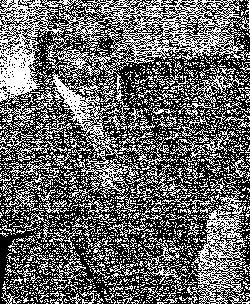
Julius and Ethel Rosenberg’s
Last Will and Testament.
|
June 18, 1953 Dear Manny, I have drawn up a last will and testament so that there can be no question about the fact that I want you to handle all our affairs and be responsible for the children, as in fact you have been doing. Ethel completely concurs in this request and is in her own hand attesting to it. Our children are the apple of our eye, our pride and most precious fortune. Love them with all your heart and always protect them in order that they grow up to be normal healthy people. That you will do this I am sure but as their proud father I take the prerogative to ask it of you, my dearest friend, and devoted brother. I love my sons most profoundly. I am not much at saying goodbyes because I believe that good accomplishments live on forever but this I can say—my love of life has never been so strong because I’ve seen how beautiful the future can be. Since I feel that we in some small measure have contributed our share in this direction, I think my sons and millions of others will have benefited by it. Words fail me when I attempt to tell of the nobility and grandeur of my life’s companion, my sweet and devoted wife. Ours is a great love and a wonderful relationship—it has made my life full and rich. My aged and ailing mother has been a source of great comfort and we always shared a mutual love and devotion. Indeed she has been selfless in her efforts on our |
behalf. My sisters and my brother have supported us from the start and were behind us 100 per cent and worked on our behalf. We can truthfully say that my family gave us sustenance in the time of our great trials. You Manny are not only considered as one of my family but are our extra special friend. The bond of brotherhood and love between us was forged in the struggle for life and all that it means and it is a source of great strength to us. Be strong for us, beloved friend, and we wish you long life to continue your fruitful work in health and happiness for without doubt you are a fine man, dear friend and sincere advocate of the people. I salute you and caress you affectionately with all my heart. Never let them change the truth of our innocence. For peace, bread and roses, in simple dignity we face the executioner with courage, confidence and perspective, never losing faith. As ever, Julie P.S. All my personal effects are in three cartons and you can get them from the Warden. All my love, Julie June 19th—Ethel wants it made known that we are the first victims of American Fascism. Ethel and Julie June 19, 1953 |


| "…Born of orthodox parents and raised in the slum tenements of the lower East Side, my childhood memories are full of the struggles of my parents to feed and clothe five children. I remember when my father, a garment worker, was in a long strike against sweatshop conditions. Because he was a shop chairman and an active | unionist, my father was blacklisted and had quite a pull to make ends meet. The constant battle against rats and vermin still is vivid in my mind…it was natural that I should follow in the footsteps laid down by my heritage and seek to better the lot of the common man…" |
IN MEMORY OF
EMMA LAZARUS
1849-1887
a pioneer of Jewish culture in America and
author of the New Colossus, inscription on
the Statue of Liberty.
On the
50th Anniversary
(May 5, 1903)
|
of the unveiling of the tablet which gave our Statue of Liberty the voice that joined the Hearts of "…huddled masses yearning to breathe free." Emma Lazarus’ spirit lives today in every American who cherishes our democratic traditions and can say— "I LIFT MY LAMP BESIDE THE Members of |
|
--Julius Rosenberg, in a letter to his wife,
Sing Sing, October 9, 1952
We salute the people of the Bronx for their support and hereby rededicate ourselves to continue unabated the fight for justice for the Rosenbergs and for Morton Sobell.
Rosenberg Committee of the Bronx
|
"We stood the thousands in Seventeenth "Out of your death, brother and sister, --A.B. Magil |
|
|
The lesson, "too little, too late," has been learned. |
|
June 19, 1953 Dearest Manny: The following letter is to be delivered to my children. Dearest Sweethearts, my most precious children: Only this morning it looked like we might be together again after all. Now that this cannot be, I wan so much for you to know all that I have come to know. Unfortunately, I may write only a few simple words! The rest of your own lives must teach you, even as mine taught me. At first, of course, you will grieve bitterly for us, but you will not grieve alone. That is our consolation and it must eventually be yours. Eventually, too, you must come to believe that life is worth the living. Be comforted, that even now, with the end of ours slowly approaching, that we know this with a conviction that defeats the executioner. Your lives must teach you too that good cannot really flourish in the midst of evil; that freedom and all the things that go to make up a truly satisfying and worth- |
while life must sometimes be purchased very dearly. Be comforted, then, that we were serene and understood with the deepest kind of understanding, that civilization had not as yet progressed to the point where life did not have to be lost for the sake of life; and that we were comforted in the sure knowledge that others would carry on after us. We wish we might have had the tremendous joy and gratification of living our lives out with you. Your Daddy who is with me in the last momentous hours sends his heart and all the love that is in it for his dearest boys. Always remember that we were innocent and could not wrong our conscience. We press you close and kiss you with all our strength. |
|
|
We pledge… We of the Brooklyn Committee pledge to Ethel and Julius Rosenberg to "carry on after us" as they knew we and millions of others would do. For them, for the sake of their "most precious children" and for America we re-dedicate ourselves to help carry on the fight for truth, and set our eyes on the immediate task of gaining justice for Morton Sobell. Brooklyn Committee to Secure Justice in the |
Why were we active in the Rosenberg campaign, and why are we going to keep fighting to bring out the truth about them and for a new trial for Morton Sobell? It wasn’t only because we knew that they were framed and convicted through stool-pigeon evidence. It was also because we knew why it was done to them. It was all part of the same game against the people and the unions and against anybody who dared talk up against war, high prices, purges, loyalty oaths, union busting and witch hunting. Taft-Hartley, get-tough foreign policy, deportations, McCarran concentration camp law, McCarran-Walter, Smith act—these and the other attacks on the rights of the American people are all part of the same plan that sent the the Rosenbergs to the chair. And it’s still the same game. They haven’t stopped with the Rosenbergs. They won’t rest until they think they have the American people under control, until all unions are "safe" and all critics are gagged. That’s the meaning of the Rosenberg Case to us, and why we will keep on fighting.
A Group of Fur Workers
|
"The Meaning is Clear Mooney, the Haymarket mas- sacre, the Rosenbergs—these and many more were all scape- goats for those who would deny the American peoples’ right to organize for a better life. But, as Joe Hill said, "we went on to organize," and that’s what we are doing in the Rosenberg and Sobell case. The meaning is clear. There will be no letup, as far as we are concerned. Clothing Workers Union, CIO |
"We Know the Lesson of his own experience what it was to have been the son of a gar- ment worker who was hunted and kept out of work for his union activities. And we gar- ment workers know the mean- ing of frame-ups and stool pig- eons. That’s why we have been in the Rosenberg fight, and why we will keep on fighting for them and Morton Sobell. None of us is safe as long as they can do this to any of us. Ladies Garment Workers Union AFL |
|
To the Rosenbergs triumph. Although you will not see it, Your tomorrow must flower. Our children shall know Your greater parentage." Rosenberg Committee stop, our efforts for truth and jus- tice in the Rosenberg-Sobell Case. Electrical Workers A Group of Film Workers and chairman of the New York Rosenberg Committee, we dedicate our continuing efforts in the Rosen- berg-Sobell campaign. Women Bronx Hungarian Woman |
If We Die know why we leave the song unsung the book unread, the work undone to rest beneath the sod. Mourn no more, my sons. no more Earth shall smile, my sons, shall --- Ossining, N.Y., A Group of Educators |
|
|
To William A. Reuben go the heartfelt wishes of the undersigned, for bringing the Rosenberg Case to the attention of the world when few knew or understood the implications of the case. In a brilliant series of articles in the National Guardian Mr. Reuben laid bare the doubts and inconsistencies surrounding the affair—articles which began to rally first the people of America and then of the world, and led to the formation of the National Committee to Secure Justice in the Rosenberg Case, of which he was first chairman. Giving up all other work to stump the country to acquaint America with the case, he labored selflessly for the cause of justice and mercy. From his wealth of experience in this and other cases, he has written a book, "The Atom Spy Myth—From Hiroshima to the Rosenbergs," which is being published by Action Books in October, 1953. In "The Atom Spy Myth," Mr. Reuben documents the hysteria of the Atom Era which led to the deaths of the Rosenbergs, and exposes it as a weapon in the Cold War. With a salute to Mr. Reuben, we dedicate this space to Julius and Ethel Rosenberg and to justice for Morton Sobell. |
| To Nelson Algren, prize-winning novelist, our appreciation for his leadership of the Chicago Committee for the Rosenbergs, for his dedication to their cause, for the long hours in the long months he spent writing and speaking for them—for being an American of whom all can be proud. Our pledge to him and to the cause of justice to continue the fight for truth. |
|
|
We pledge anew our all-out ef- forts to continue the fight to let Rosenberg Committee |
With indescribable pain in our From Many Good Friends |
Jewish Life pledges to continue to fight
for their vindication.
Jewish Life pledges to fight for a new trial for Morton Sobell.
ALICE CITRON SAM PEVZNER MORRIS U. SCHAPPES LOUIS HARAP, Managing Editor
"I was charged with murdering a scab during a strike at the Chicago International Harvester plant. I was innocent, but that made no difference to the newspapers, the radio, and television experts… I was fortunate in having my union behind me. They knew I was innocent and rallied to my defense, raising sufficient funds to guarantee the best possible legal defense and to make public the true facts of my case.
"I was found ‘Not Guilty.’
"It did not happen this way with the Rosenbergs. They had no one to back them up. There was no
challenge to what the newspapers and radio said. The jury got a one-sided picture. One of the witnesses against the Rosenbergs was proven to be a liar recently—in a sworn affidavit by the F.B.I. How would the jury have voted if they knew then that this witness had lied?
--Harold E. Ward, union leader in Local 108, F.E., United Electrical,
Radio and Machine Workers of America, Chicago.
We pledge to Michael and Robbie that we shall spread the truth in the Rosenberg Case.
South Westchester Rosenberg Committee
Yonkers New Rochelle Mamaroneck White Plains Rye
|
"There was once a wise man, I forget his name, --(From a letter by Ethel to Julius Rosenberg) |
 Members of District 65, CIO Members of Retail Drug Employees Union, CIO |
We further express our deep interest and concern for the plight of Morton Sobell and his family. His imprisonment at Alcatraz precludes the visiting of his children with him—a humane and basic right to which all children are entitled. The doubts and confusion in the Sobell and Rosenberg cases add up to a very fair and just request for a new trial. We feel challenged to offer our active support to secure full justice for the Sobell family.

Social Service Workers
|
As writers, we are humble in the face of the Committee of Writers |
From newspaper and job shops all over New Members of Printing Trades |
|
Death Of Ethel
Moving documents, Human, Hopeful In the Face Of Trial, Torture and Death—Their Personal Messages to Each Other, to the Children, to their Attorney—to all America and to the World.
All Profits from the Sale of the Book go to the Rosenberg Children.
$1 from |
"The Case of By John Wexley
The eloquent Prologue which appears in full in this publication is the first part of the forthcoming book, The Case of Julius and Ethel Rosenberg, by John Wexley. It will tell, for the first time in book form, the whole story— the trial, the evidence, the frameup—a complete account of the case presented in the matrix of the national and world-wide protest which resulted from the legal murder of the Rosenbergs as part of the technique of reaction to intimidate the democratic forces behind the peace movement. More than a year’s study and participation in the case have gone into Mr. Wexley’s penetrating and revealing study of this, the most important legal case in the history of American democracy. Mr. Wexley is the author of two long running plays, The Last Mile and They Shall Not Die, memorable play about the Scottsboro Case. The book’s Price will be $3 for the regular edition, bound in boards. The author will autograph each copy ordered on the coupon below. -------------------------------------------------------- CAMERON and KAHN, Inc. |
"The love we bear our two sons and each other demands that we hold fast to these truths, even to the death which may destroy our little family.
"We are not the first victims of tyranny. Six million of our co-religionists and millions of other innocent victims of fascism went to the death chambers. The war criminals who had a part in committing these crimes are daily being freed by representatives of our government. Here, now, on behalf of the sovereign people of the United States, the administration wants to stain the good name of our country with the blood of the Rosenbergs. We are confident that the people will raise a mighty cry against this new great danger which threatens to engulf millions by dooming two innocent Americans first."
--Julius Rosenberg in a letter to Emanuel H. Bloch, February 2, 1953.
We pledge to "hold fast to these truths," just as the Rosenbergs did with their inspiring courage. We dedicate ourselves to continue the fight to bring the truth in the case to the American people.
Detroit Rosenberg Committee
Theatre Workers for Clemency
|
"Here behind the grim walls of Alcatraz it’s hard to feel that Ethel and Julie are dead. How could they do it? What are they so afraid of? Even if it were possible, philosophically speaking, to conceive of his death for political purposes, what about hers? To take a woman, a wife and a mother, subject her to two years alone in a death cell, and then lead her to the electric chair is mockery of civilization. "That this harshness was reserved for those who declared their innocence while those who said they were guilty were treated with the utmost consideration is a most troublesome thing. "There are worse things than facing death when you are innocent and when your cause is just. It is far worse to face the death of your beloved, your children orphaned. Not one bit of this was spared Ethel and Julius Rosenberg. That they did not break under this heavy load gives a new meaning to human dignity. They held their innocence tenderly, knowing its worth for themselves, their children, for us and our country --Morton Sobell, Alcatraz, |
|
The boundary between life and death seems sharp and clear. Yet sometimes life reaches over into death. Life claims for its own the love which casts out fear which did not die with Ethel and Julius Rosenberg. It claims the dignity with which an innocent Ethel and Julius Rosenberg went to their death unmoved by the importunities of those who offered them life for surrender, for dishonor, for lies. Life finds anger in the death of a young mother and father, in two children orphaned.
Sometimes death reaches over into life. For over one thousand days and nights Morton Sobell has rejected the death a man must die if he sells himself into the slavery of lies and false witness. No part of Morton Sobell lies dead in the grave of the informer; his innocence is that integral part of him which guarantees the chains wrapped tightly around him.
Each day, in Alcatraz, death reaches over into life for Morton Sobell and demands, "Die a little in your mind and body, you have ten thousand days of dying stretched before you. Young? Your youth is doomed. Ten thousand nights of loneliness will parch your lips, put an end to passion. Babies? They are strangers now forever. Your wife? She will love you, each day building the new fire, each day tossing lighted brands into the air."
Each day there comes the answer, "Not for me and mine. We are living, working, fighting. Take your death to those who need it. Let them curtain off their own dark deeds. I have innocence and honor, clean years of work and study, love of life. I have need for living, I have no use for dying. Those who love life will come and set me free."Each day Morton Sobell spends in Alcatraz shadows your life. He is as innocent as you are; you who love life must set him free.
HELEN SOBELL